Analysing Organisational Behaviour: A David Co. Ltd Report - Unit 12
VerifiedAdded on 2020/10/05
|18
|4966
|378
Report
AI Summary
This report provides an in-depth analysis of organisational behaviour within A David Co. Ltd, a food and beverage firm. It explores the impact of organisational culture, power dynamics, and politics on individual and team behaviour, referencing Handy's Model of Organisational Culture. The report delves into motivation theories, including Maslow's Hierarchy of Needs and Vroom's Expectancy Theory, evaluating their application in the company. Furthermore, it examines team development using Tuckman's model and contrasts effective versus ineffective team dynamics. The report concludes with insights into how these concepts influence employee performance and organisational success, with the aim of improving employee retention and overall organisational performance. This report is a valuable resource for students seeking to understand the complexities of organizational behaviour.
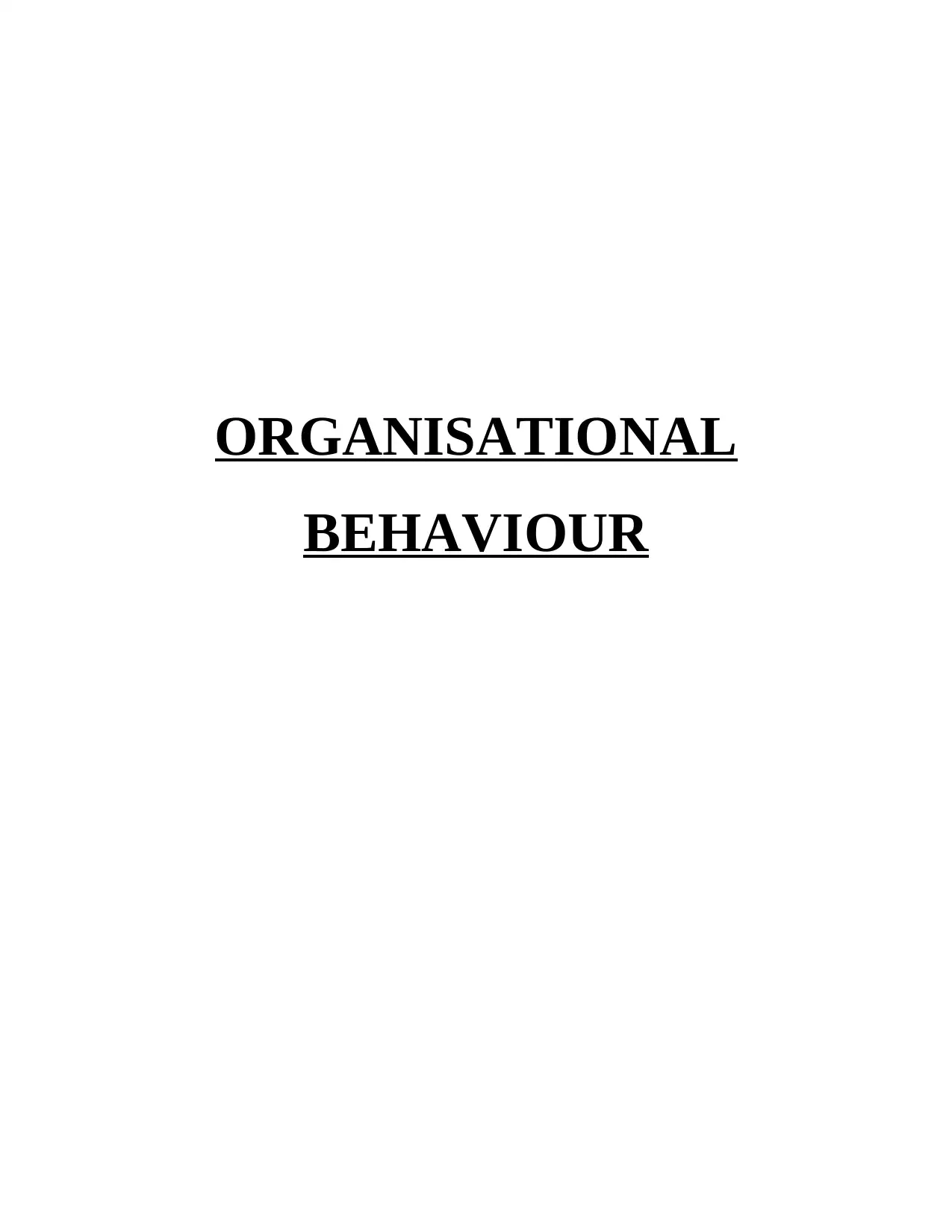
ORGANISATIONAL
BEHAVIOUR
BEHAVIOUR
Paraphrase This Document
Need a fresh take? Get an instant paraphrase of this document with our AI Paraphraser
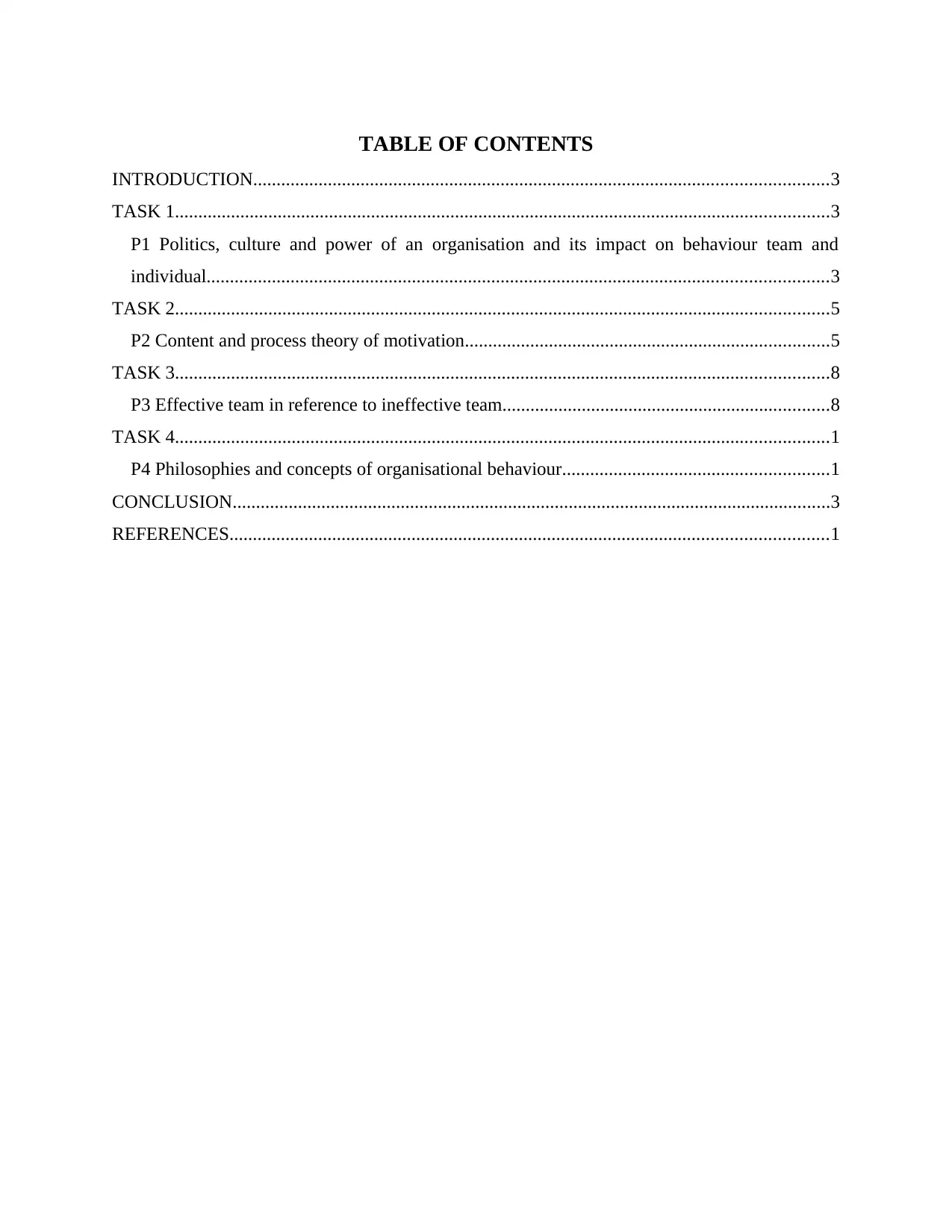
TABLE OF CONTENTS
INTRODUCTION...........................................................................................................................3
TASK 1............................................................................................................................................3
P1 Politics, culture and power of an organisation and its impact on behaviour team and
individual.....................................................................................................................................3
TASK 2............................................................................................................................................5
P2 Content and process theory of motivation..............................................................................5
TASK 3............................................................................................................................................8
P3 Effective team in reference to ineffective team......................................................................8
TASK 4............................................................................................................................................1
P4 Philosophies and concepts of organisational behaviour.........................................................1
CONCLUSION................................................................................................................................3
REFERENCES................................................................................................................................1
INTRODUCTION...........................................................................................................................3
TASK 1............................................................................................................................................3
P1 Politics, culture and power of an organisation and its impact on behaviour team and
individual.....................................................................................................................................3
TASK 2............................................................................................................................................5
P2 Content and process theory of motivation..............................................................................5
TASK 3............................................................................................................................................8
P3 Effective team in reference to ineffective team......................................................................8
TASK 4............................................................................................................................................1
P4 Philosophies and concepts of organisational behaviour.........................................................1
CONCLUSION................................................................................................................................3
REFERENCES................................................................................................................................1
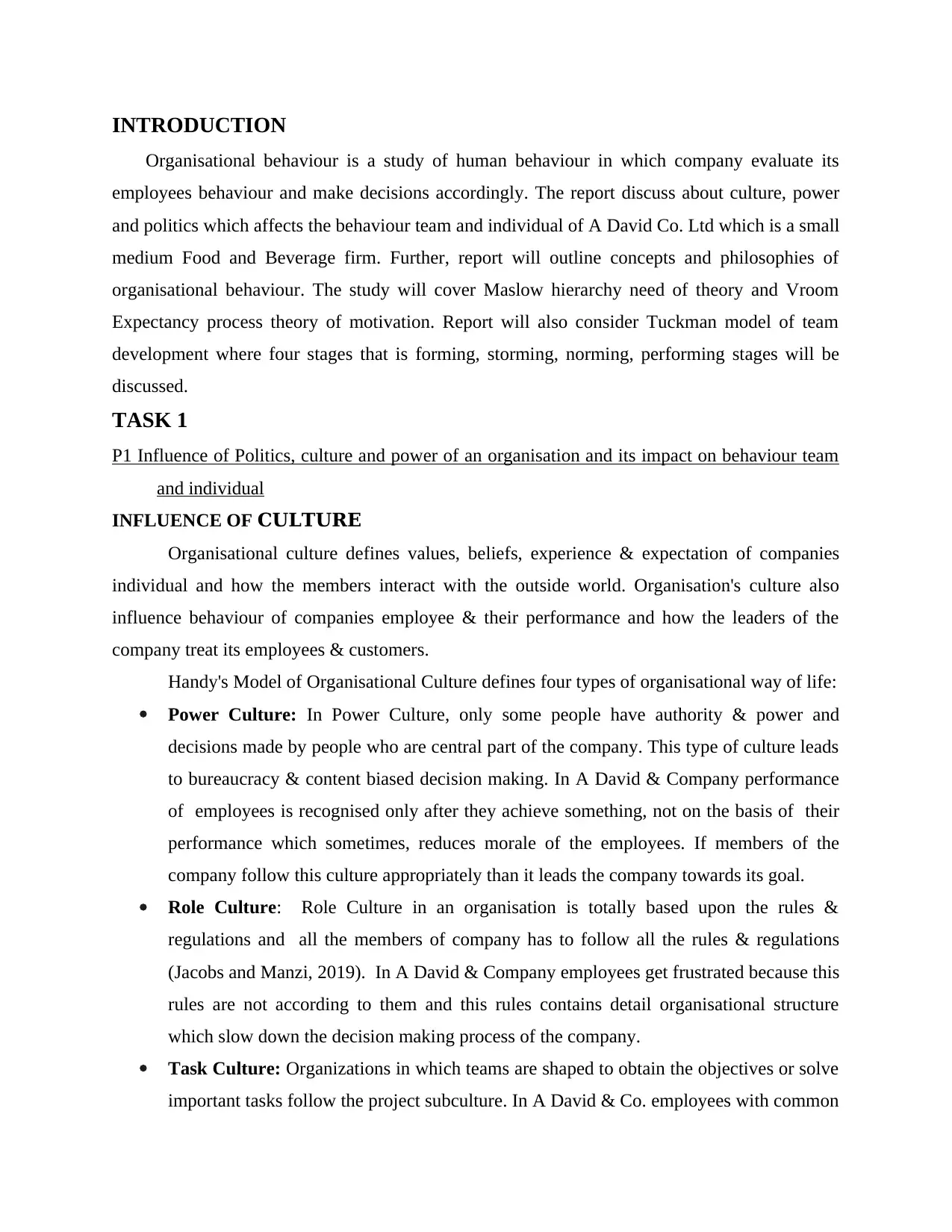
INTRODUCTION
Organisational behaviour is a study of human behaviour in which company evaluate its
employees behaviour and make decisions accordingly. The report discuss about culture, power
and politics which affects the behaviour team and individual of A David Co. Ltd which is a small
medium Food and Beverage firm. Further, report will outline concepts and philosophies of
organisational behaviour. The study will cover Maslow hierarchy need of theory and Vroom
Expectancy process theory of motivation. Report will also consider Tuckman model of team
development where four stages that is forming, storming, norming, performing stages will be
discussed.
TASK 1
P1 Influence of Politics, culture and power of an organisation and its impact on behaviour team
and individual
INFLUENCE OF CULTURE
Organisational culture defines values, beliefs, experience & expectation of companies
individual and how the members interact with the outside world. Organisation's culture also
influence behaviour of companies employee & their performance and how the leaders of the
company treat its employees & customers.
Handy's Model of Organisational Culture defines four types of organisational way of life:
Power Culture: In Power Culture, only some people have authority & power and
decisions made by people who are central part of the company. This type of culture leads
to bureaucracy & content biased decision making. In A David & Company performance
of employees is recognised only after they achieve something, not on the basis of their
performance which sometimes, reduces morale of the employees. If members of the
company follow this culture appropriately than it leads the company towards its goal.
Role Culture: Role Culture in an organisation is totally based upon the rules &
regulations and all the members of company has to follow all the rules & regulations
(Jacobs and Manzi, 2019). In A David & Company employees get frustrated because this
rules are not according to them and this rules contains detail organisational structure
which slow down the decision making process of the company.
Task Culture: Organizations in which teams are shaped to obtain the objectives or solve
important tasks follow the project subculture. In A David & Co. employees with common
Organisational behaviour is a study of human behaviour in which company evaluate its
employees behaviour and make decisions accordingly. The report discuss about culture, power
and politics which affects the behaviour team and individual of A David Co. Ltd which is a small
medium Food and Beverage firm. Further, report will outline concepts and philosophies of
organisational behaviour. The study will cover Maslow hierarchy need of theory and Vroom
Expectancy process theory of motivation. Report will also consider Tuckman model of team
development where four stages that is forming, storming, norming, performing stages will be
discussed.
TASK 1
P1 Influence of Politics, culture and power of an organisation and its impact on behaviour team
and individual
INFLUENCE OF CULTURE
Organisational culture defines values, beliefs, experience & expectation of companies
individual and how the members interact with the outside world. Organisation's culture also
influence behaviour of companies employee & their performance and how the leaders of the
company treat its employees & customers.
Handy's Model of Organisational Culture defines four types of organisational way of life:
Power Culture: In Power Culture, only some people have authority & power and
decisions made by people who are central part of the company. This type of culture leads
to bureaucracy & content biased decision making. In A David & Company performance
of employees is recognised only after they achieve something, not on the basis of their
performance which sometimes, reduces morale of the employees. If members of the
company follow this culture appropriately than it leads the company towards its goal.
Role Culture: Role Culture in an organisation is totally based upon the rules &
regulations and all the members of company has to follow all the rules & regulations
(Jacobs and Manzi, 2019). In A David & Company employees get frustrated because this
rules are not according to them and this rules contains detail organisational structure
which slow down the decision making process of the company.
Task Culture: Organizations in which teams are shaped to obtain the objectives or solve
important tasks follow the project subculture. In A David & Co. employees with common
⊘ This is a preview!⊘
Do you want full access?
Subscribe today to unlock all pages.

Trusted by 1+ million students worldwide
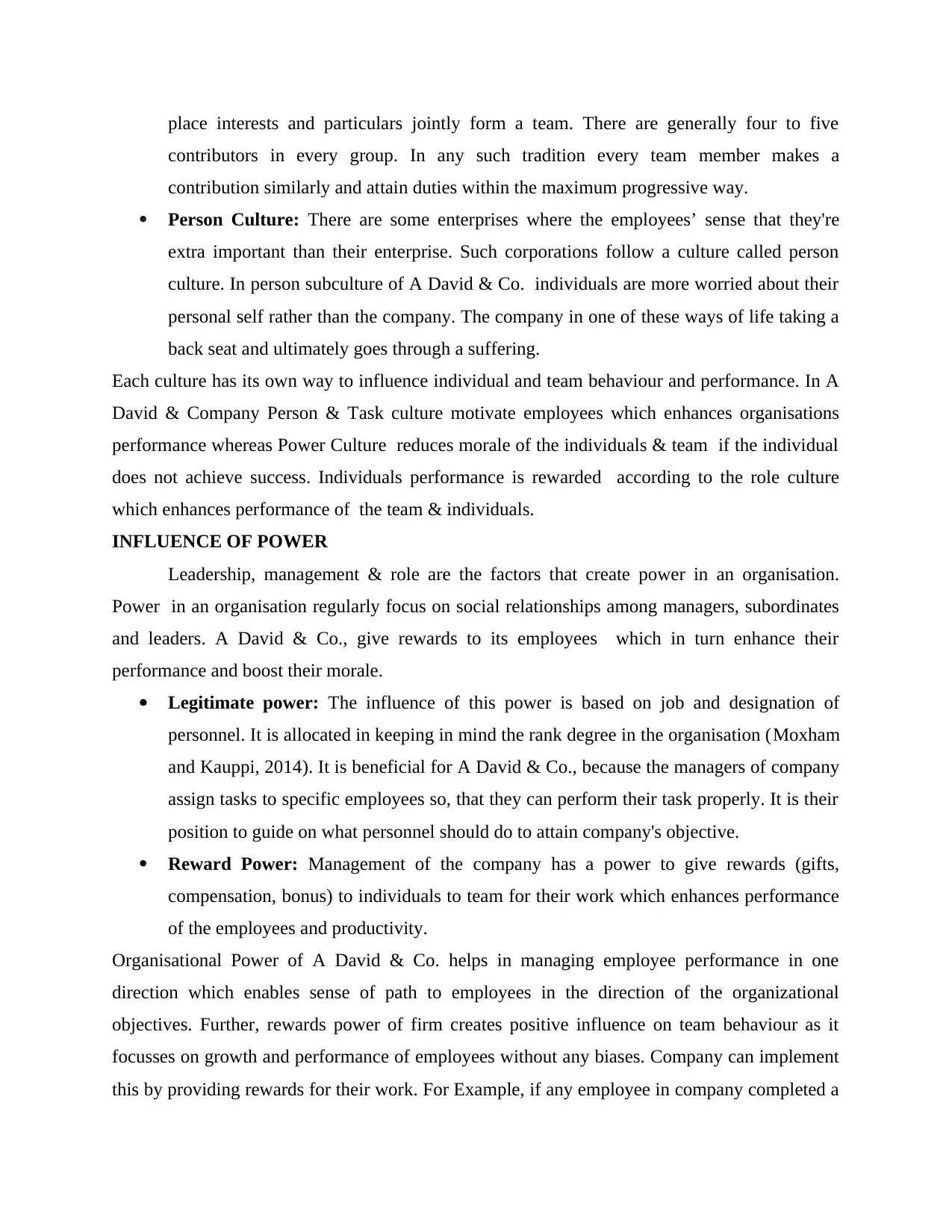
place interests and particulars jointly form a team. There are generally four to five
contributors in every group. In any such tradition every team member makes a
contribution similarly and attain duties within the maximum progressive way.
Person Culture: There are some enterprises where the employees’ sense that they're
extra important than their enterprise. Such corporations follow a culture called person
culture. In person subculture of A David & Co. individuals are more worried about their
personal self rather than the company. The company in one of these ways of life taking a
back seat and ultimately goes through a suffering.
Each culture has its own way to influence individual and team behaviour and performance. In A
David & Company Person & Task culture motivate employees which enhances organisations
performance whereas Power Culture reduces morale of the individuals & team if the individual
does not achieve success. Individuals performance is rewarded according to the role culture
which enhances performance of the team & individuals.
INFLUENCE OF POWER
Leadership, management & role are the factors that create power in an organisation.
Power in an organisation regularly focus on social relationships among managers, subordinates
and leaders. A David & Co., give rewards to its employees which in turn enhance their
performance and boost their morale.
Legitimate power: The influence of this power is based on job and designation of
personnel. It is allocated in keeping in mind the rank degree in the organisation (Moxham
and Kauppi, 2014). It is beneficial for A David & Co., because the managers of company
assign tasks to specific employees so, that they can perform their task properly. It is their
position to guide on what personnel should do to attain company's objective.
Reward Power: Management of the company has a power to give rewards (gifts,
compensation, bonus) to individuals to team for their work which enhances performance
of the employees and productivity.
Organisational Power of A David & Co. helps in managing employee performance in one
direction which enables sense of path to employees in the direction of the organizational
objectives. Further, rewards power of firm creates positive influence on team behaviour as it
focusses on growth and performance of employees without any biases. Company can implement
this by providing rewards for their work. For Example, if any employee in company completed a
contributors in every group. In any such tradition every team member makes a
contribution similarly and attain duties within the maximum progressive way.
Person Culture: There are some enterprises where the employees’ sense that they're
extra important than their enterprise. Such corporations follow a culture called person
culture. In person subculture of A David & Co. individuals are more worried about their
personal self rather than the company. The company in one of these ways of life taking a
back seat and ultimately goes through a suffering.
Each culture has its own way to influence individual and team behaviour and performance. In A
David & Company Person & Task culture motivate employees which enhances organisations
performance whereas Power Culture reduces morale of the individuals & team if the individual
does not achieve success. Individuals performance is rewarded according to the role culture
which enhances performance of the team & individuals.
INFLUENCE OF POWER
Leadership, management & role are the factors that create power in an organisation.
Power in an organisation regularly focus on social relationships among managers, subordinates
and leaders. A David & Co., give rewards to its employees which in turn enhance their
performance and boost their morale.
Legitimate power: The influence of this power is based on job and designation of
personnel. It is allocated in keeping in mind the rank degree in the organisation (Moxham
and Kauppi, 2014). It is beneficial for A David & Co., because the managers of company
assign tasks to specific employees so, that they can perform their task properly. It is their
position to guide on what personnel should do to attain company's objective.
Reward Power: Management of the company has a power to give rewards (gifts,
compensation, bonus) to individuals to team for their work which enhances performance
of the employees and productivity.
Organisational Power of A David & Co. helps in managing employee performance in one
direction which enables sense of path to employees in the direction of the organizational
objectives. Further, rewards power of firm creates positive influence on team behaviour as it
focusses on growth and performance of employees without any biases. Company can implement
this by providing rewards for their work. For Example, if any employee in company completed a
Paraphrase This Document
Need a fresh take? Get an instant paraphrase of this document with our AI Paraphraser
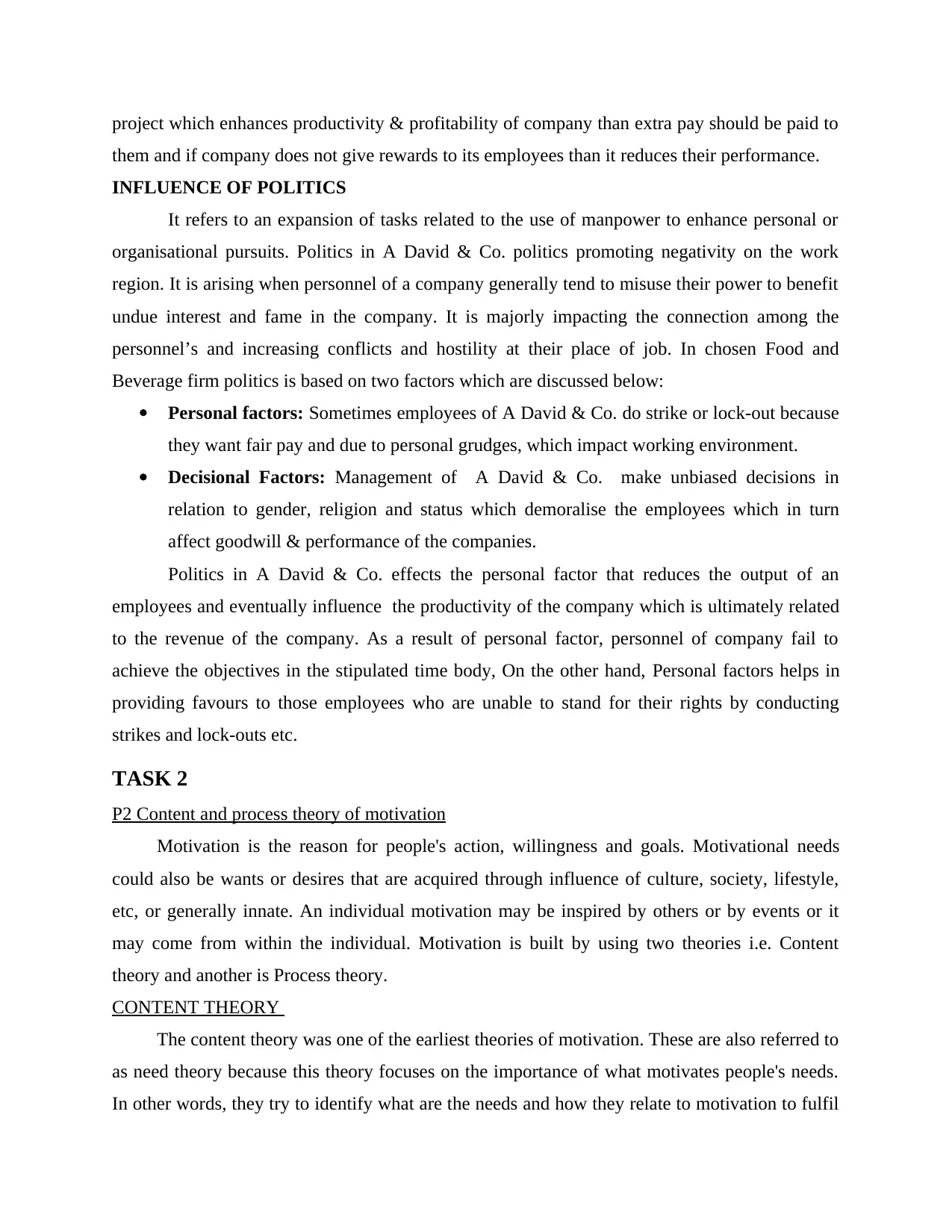
project which enhances productivity & profitability of company than extra pay should be paid to
them and if company does not give rewards to its employees than it reduces their performance.
INFLUENCE OF POLITICS
It refers to an expansion of tasks related to the use of manpower to enhance personal or
organisational pursuits. Politics in A David & Co. politics promoting negativity on the work
region. It is arising when personnel of a company generally tend to misuse their power to benefit
undue interest and fame in the company. It is majorly impacting the connection among the
personnel’s and increasing conflicts and hostility at their place of job. In chosen Food and
Beverage firm politics is based on two factors which are discussed below:
Personal factors: Sometimes employees of A David & Co. do strike or lock-out because
they want fair pay and due to personal grudges, which impact working environment.
Decisional Factors: Management of A David & Co. make unbiased decisions in
relation to gender, religion and status which demoralise the employees which in turn
affect goodwill & performance of the companies.
Politics in A David & Co. effects the personal factor that reduces the output of an
employees and eventually influence the productivity of the company which is ultimately related
to the revenue of the company. As a result of personal factor, personnel of company fail to
achieve the objectives in the stipulated time body, On the other hand, Personal factors helps in
providing favours to those employees who are unable to stand for their rights by conducting
strikes and lock-outs etc.
TASK 2
P2 Content and process theory of motivation
Motivation is the reason for people's action, willingness and goals. Motivational needs
could also be wants or desires that are acquired through influence of culture, society, lifestyle,
etc, or generally innate. An individual motivation may be inspired by others or by events or it
may come from within the individual. Motivation is built by using two theories i.e. Content
theory and another is Process theory.
CONTENT THEORY
The content theory was one of the earliest theories of motivation. These are also referred to
as need theory because this theory focuses on the importance of what motivates people's needs.
In other words, they try to identify what are the needs and how they relate to motivation to fulfil
them and if company does not give rewards to its employees than it reduces their performance.
INFLUENCE OF POLITICS
It refers to an expansion of tasks related to the use of manpower to enhance personal or
organisational pursuits. Politics in A David & Co. politics promoting negativity on the work
region. It is arising when personnel of a company generally tend to misuse their power to benefit
undue interest and fame in the company. It is majorly impacting the connection among the
personnel’s and increasing conflicts and hostility at their place of job. In chosen Food and
Beverage firm politics is based on two factors which are discussed below:
Personal factors: Sometimes employees of A David & Co. do strike or lock-out because
they want fair pay and due to personal grudges, which impact working environment.
Decisional Factors: Management of A David & Co. make unbiased decisions in
relation to gender, religion and status which demoralise the employees which in turn
affect goodwill & performance of the companies.
Politics in A David & Co. effects the personal factor that reduces the output of an
employees and eventually influence the productivity of the company which is ultimately related
to the revenue of the company. As a result of personal factor, personnel of company fail to
achieve the objectives in the stipulated time body, On the other hand, Personal factors helps in
providing favours to those employees who are unable to stand for their rights by conducting
strikes and lock-outs etc.
TASK 2
P2 Content and process theory of motivation
Motivation is the reason for people's action, willingness and goals. Motivational needs
could also be wants or desires that are acquired through influence of culture, society, lifestyle,
etc, or generally innate. An individual motivation may be inspired by others or by events or it
may come from within the individual. Motivation is built by using two theories i.e. Content
theory and another is Process theory.
CONTENT THEORY
The content theory was one of the earliest theories of motivation. These are also referred to
as need theory because this theory focuses on the importance of what motivates people's needs.
In other words, they try to identify what are the needs and how they relate to motivation to fulfil
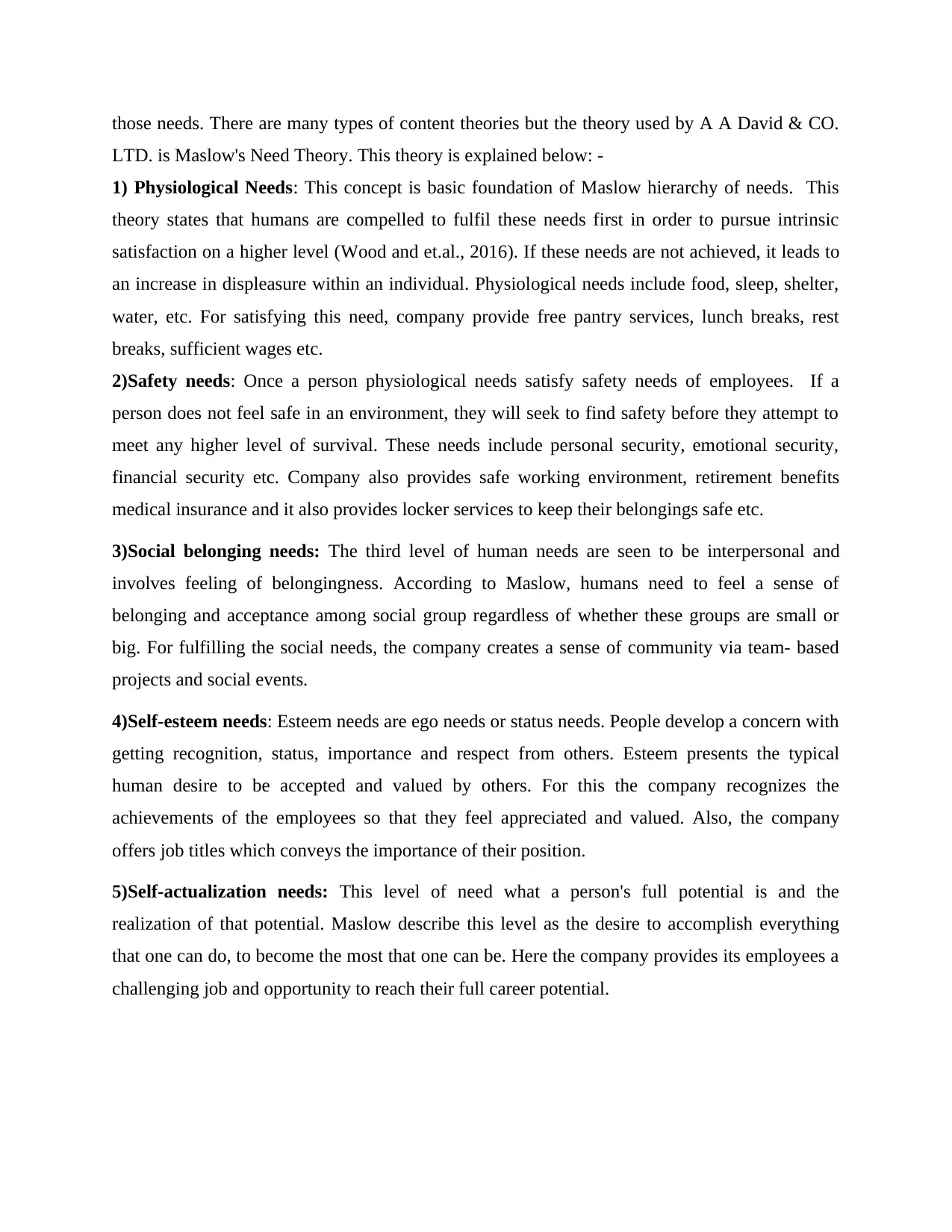
those needs. There are many types of content theories but the theory used by A A David & CO.
LTD. is Maslow's Need Theory. This theory is explained below: -
1) Physiological Needs: This concept is basic foundation of Maslow hierarchy of needs. This
theory states that humans are compelled to fulfil these needs first in order to pursue intrinsic
satisfaction on a higher level (Wood and et.al., 2016). If these needs are not achieved, it leads to
an increase in displeasure within an individual. Physiological needs include food, sleep, shelter,
water, etc. For satisfying this need, company provide free pantry services, lunch breaks, rest
breaks, sufficient wages etc.
2)Safety needs: Once a person physiological needs satisfy safety needs of employees. If a
person does not feel safe in an environment, they will seek to find safety before they attempt to
meet any higher level of survival. These needs include personal security, emotional security,
financial security etc. Company also provides safe working environment, retirement benefits
medical insurance and it also provides locker services to keep their belongings safe etc.
3)Social belonging needs: The third level of human needs are seen to be interpersonal and
involves feeling of belongingness. According to Maslow, humans need to feel a sense of
belonging and acceptance among social group regardless of whether these groups are small or
big. For fulfilling the social needs, the company creates a sense of community via team- based
projects and social events.
4)Self-esteem needs: Esteem needs are ego needs or status needs. People develop a concern with
getting recognition, status, importance and respect from others. Esteem presents the typical
human desire to be accepted and valued by others. For this the company recognizes the
achievements of the employees so that they feel appreciated and valued. Also, the company
offers job titles which conveys the importance of their position.
5)Self-actualization needs: This level of need what a person's full potential is and the
realization of that potential. Maslow describe this level as the desire to accomplish everything
that one can do, to become the most that one can be. Here the company provides its employees a
challenging job and opportunity to reach their full career potential.
LTD. is Maslow's Need Theory. This theory is explained below: -
1) Physiological Needs: This concept is basic foundation of Maslow hierarchy of needs. This
theory states that humans are compelled to fulfil these needs first in order to pursue intrinsic
satisfaction on a higher level (Wood and et.al., 2016). If these needs are not achieved, it leads to
an increase in displeasure within an individual. Physiological needs include food, sleep, shelter,
water, etc. For satisfying this need, company provide free pantry services, lunch breaks, rest
breaks, sufficient wages etc.
2)Safety needs: Once a person physiological needs satisfy safety needs of employees. If a
person does not feel safe in an environment, they will seek to find safety before they attempt to
meet any higher level of survival. These needs include personal security, emotional security,
financial security etc. Company also provides safe working environment, retirement benefits
medical insurance and it also provides locker services to keep their belongings safe etc.
3)Social belonging needs: The third level of human needs are seen to be interpersonal and
involves feeling of belongingness. According to Maslow, humans need to feel a sense of
belonging and acceptance among social group regardless of whether these groups are small or
big. For fulfilling the social needs, the company creates a sense of community via team- based
projects and social events.
4)Self-esteem needs: Esteem needs are ego needs or status needs. People develop a concern with
getting recognition, status, importance and respect from others. Esteem presents the typical
human desire to be accepted and valued by others. For this the company recognizes the
achievements of the employees so that they feel appreciated and valued. Also, the company
offers job titles which conveys the importance of their position.
5)Self-actualization needs: This level of need what a person's full potential is and the
realization of that potential. Maslow describe this level as the desire to accomplish everything
that one can do, to become the most that one can be. Here the company provides its employees a
challenging job and opportunity to reach their full career potential.
⊘ This is a preview!⊘
Do you want full access?
Subscribe today to unlock all pages.

Trusted by 1+ million students worldwide
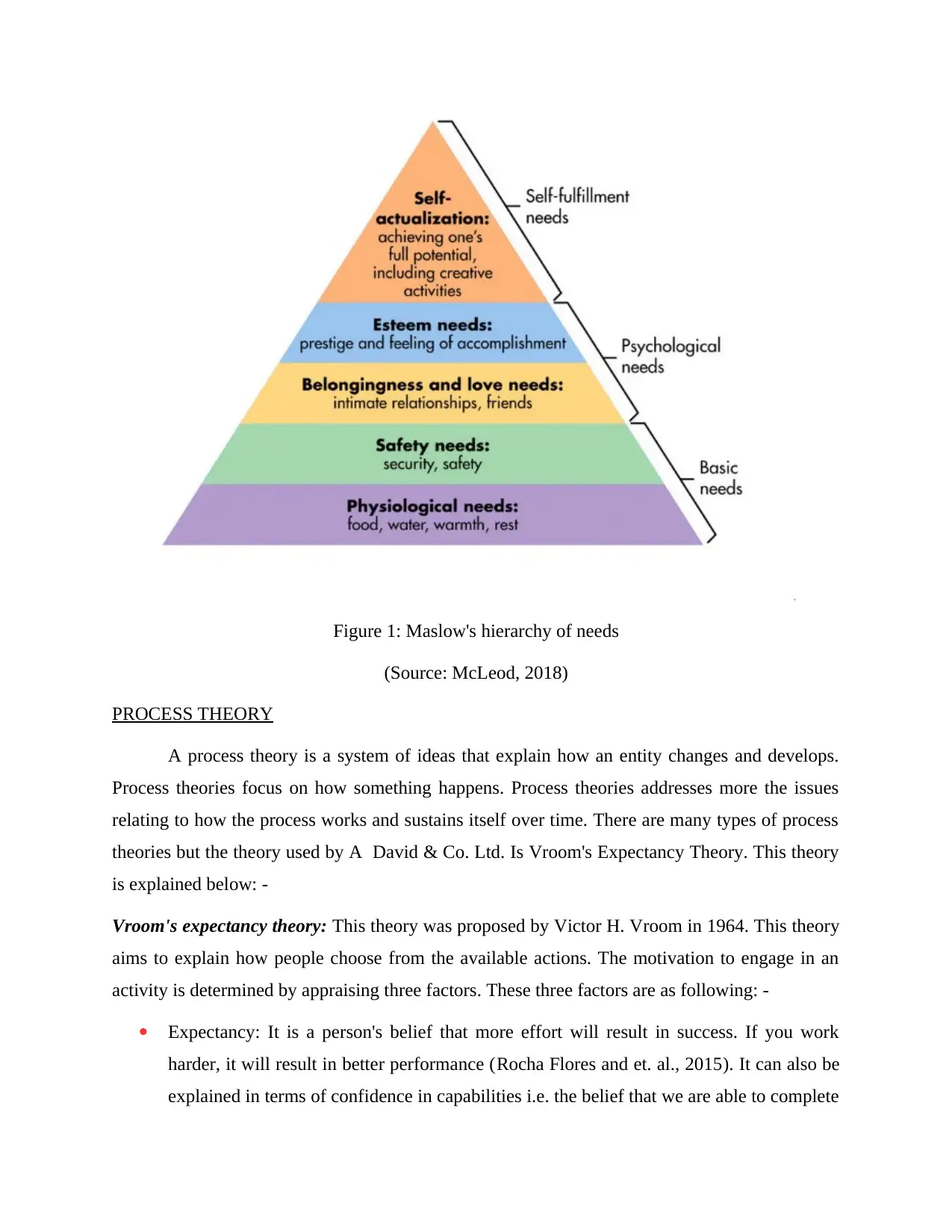
Figure 1: Maslow's hierarchy of needs
(Source: McLeod, 2018)
PROCESS THEORY
A process theory is a system of ideas that explain how an entity changes and develops.
Process theories focus on how something happens. Process theories addresses more the issues
relating to how the process works and sustains itself over time. There are many types of process
theories but the theory used by A David & Co. Ltd. Is Vroom's Expectancy Theory. This theory
is explained below: -
Vroom's expectancy theory: This theory was proposed by Victor H. Vroom in 1964. This theory
aims to explain how people choose from the available actions. The motivation to engage in an
activity is determined by appraising three factors. These three factors are as following: -
Expectancy: It is a person's belief that more effort will result in success. If you work
harder, it will result in better performance (Rocha Flores and et. al., 2015). It can also be
explained in terms of confidence in capabilities i.e. the belief that we are able to complete
(Source: McLeod, 2018)
PROCESS THEORY
A process theory is a system of ideas that explain how an entity changes and develops.
Process theories focus on how something happens. Process theories addresses more the issues
relating to how the process works and sustains itself over time. There are many types of process
theories but the theory used by A David & Co. Ltd. Is Vroom's Expectancy Theory. This theory
is explained below: -
Vroom's expectancy theory: This theory was proposed by Victor H. Vroom in 1964. This theory
aims to explain how people choose from the available actions. The motivation to engage in an
activity is determined by appraising three factors. These three factors are as following: -
Expectancy: It is a person's belief that more effort will result in success. If you work
harder, it will result in better performance (Rocha Flores and et. al., 2015). It can also be
explained in terms of confidence in capabilities i.e. the belief that we are able to complete
Paraphrase This Document
Need a fresh take? Get an instant paraphrase of this document with our AI Paraphraser
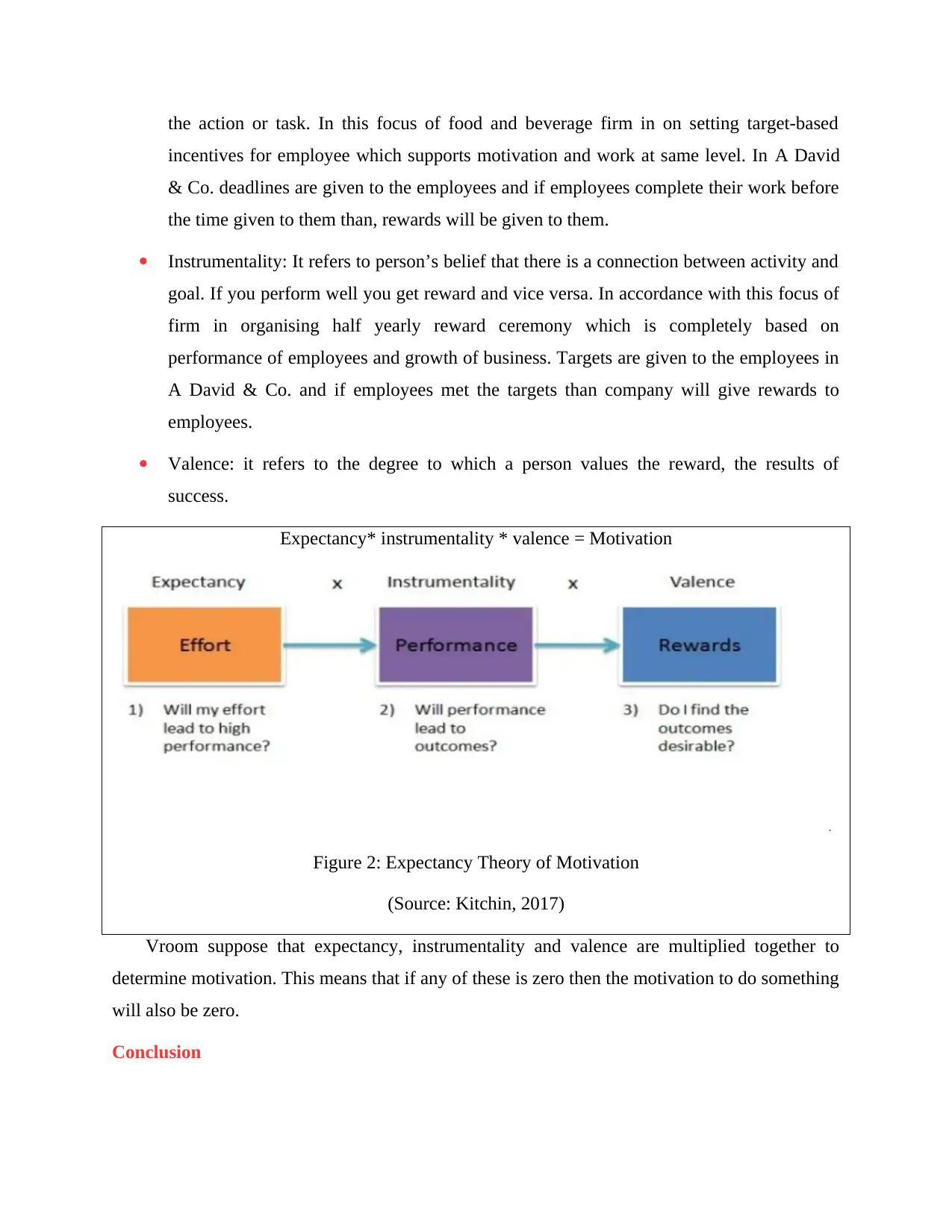
the action or task. In this focus of food and beverage firm in on setting target-based
incentives for employee which supports motivation and work at same level. In A David
& Co. deadlines are given to the employees and if employees complete their work before
the time given to them than, rewards will be given to them.
Instrumentality: It refers to person’s belief that there is a connection between activity and
goal. If you perform well you get reward and vice versa. In accordance with this focus of
firm in organising half yearly reward ceremony which is completely based on
performance of employees and growth of business. Targets are given to the employees in
A David & Co. and if employees met the targets than company will give rewards to
employees.
Valence: it refers to the degree to which a person values the reward, the results of
success.
Expectancy* instrumentality * valence = Motivation
Figure 2: Expectancy Theory of Motivation
(Source: Kitchin, 2017)
Vroom suppose that expectancy, instrumentality and valence are multiplied together to
determine motivation. This means that if any of these is zero then the motivation to do something
will also be zero.
Conclusion
incentives for employee which supports motivation and work at same level. In A David
& Co. deadlines are given to the employees and if employees complete their work before
the time given to them than, rewards will be given to them.
Instrumentality: It refers to person’s belief that there is a connection between activity and
goal. If you perform well you get reward and vice versa. In accordance with this focus of
firm in organising half yearly reward ceremony which is completely based on
performance of employees and growth of business. Targets are given to the employees in
A David & Co. and if employees met the targets than company will give rewards to
employees.
Valence: it refers to the degree to which a person values the reward, the results of
success.
Expectancy* instrumentality * valence = Motivation
Figure 2: Expectancy Theory of Motivation
(Source: Kitchin, 2017)
Vroom suppose that expectancy, instrumentality and valence are multiplied together to
determine motivation. This means that if any of these is zero then the motivation to do something
will also be zero.
Conclusion
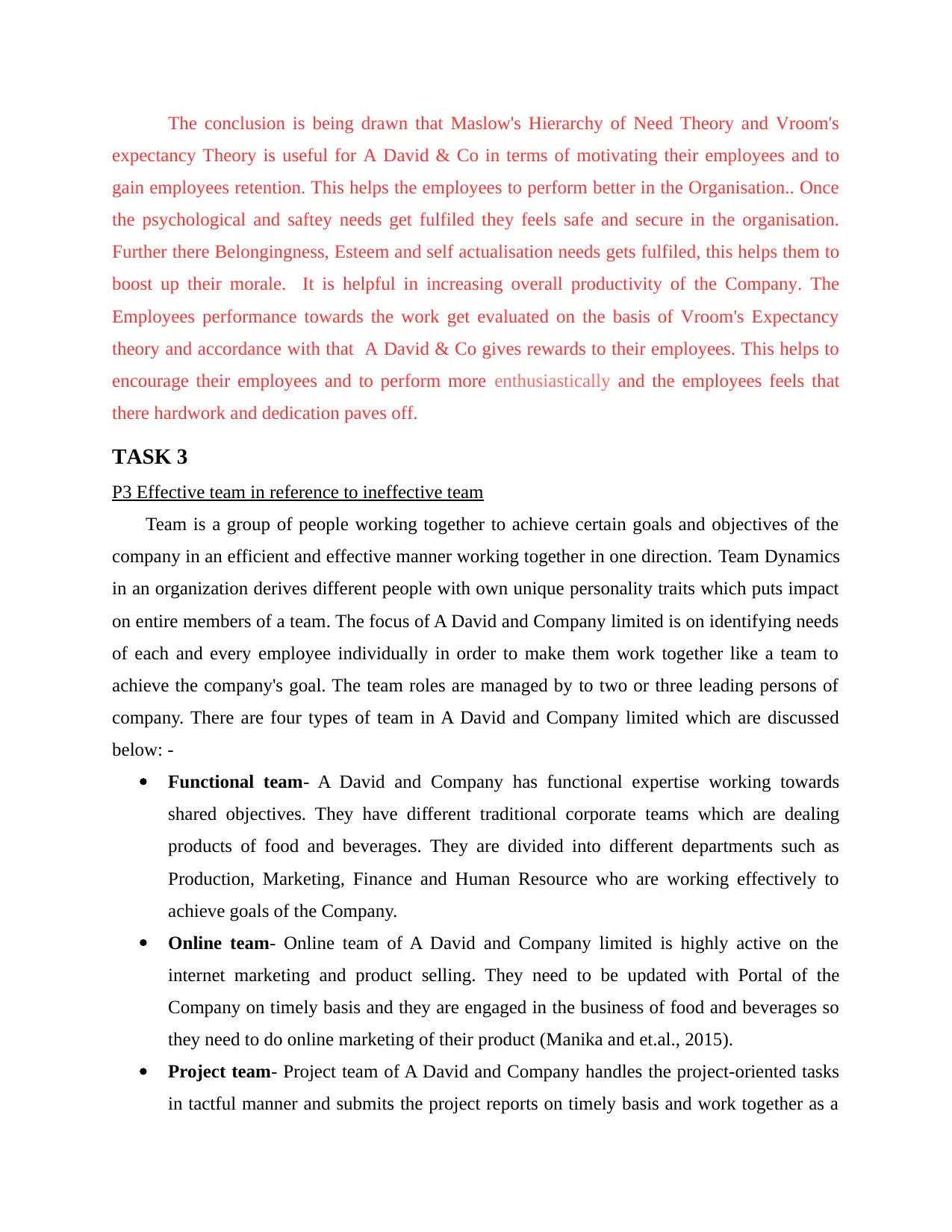
The conclusion is being drawn that Maslow's Hierarchy of Need Theory and Vroom's
expectancy Theory is useful for A David & Co in terms of motivating their employees and to
gain employees retention. This helps the employees to perform better in the Organisation.. Once
the psychological and saftey needs get fulfiled they feels safe and secure in the organisation.
Further there Belongingness, Esteem and self actualisation needs gets fulfiled, this helps them to
boost up their morale. It is helpful in increasing overall productivity of the Company. The
Employees performance towards the work get evaluated on the basis of Vroom's Expectancy
theory and accordance with that A David & Co gives rewards to their employees. This helps to
encourage their employees and to perform more enthusiastically and the employees feels that
there hardwork and dedication paves off.
TASK 3
P3 Effective team in reference to ineffective team
Team is a group of people working together to achieve certain goals and objectives of the
company in an efficient and effective manner working together in one direction. Team Dynamics
in an organization derives different people with own unique personality traits which puts impact
on entire members of a team. The focus of A David and Company limited is on identifying needs
of each and every employee individually in order to make them work together like a team to
achieve the company's goal. The team roles are managed by to two or three leading persons of
company. There are four types of team in A David and Company limited which are discussed
below: -
Functional team- A David and Company has functional expertise working towards
shared objectives. They have different traditional corporate teams which are dealing
products of food and beverages. They are divided into different departments such as
Production, Marketing, Finance and Human Resource who are working effectively to
achieve goals of the Company.
Online team- Online team of A David and Company limited is highly active on the
internet marketing and product selling. They need to be updated with Portal of the
Company on timely basis and they are engaged in the business of food and beverages so
they need to do online marketing of their product (Manika and et.al., 2015).
Project team- Project team of A David and Company handles the project-oriented tasks
in tactful manner and submits the project reports on timely basis and work together as a
expectancy Theory is useful for A David & Co in terms of motivating their employees and to
gain employees retention. This helps the employees to perform better in the Organisation.. Once
the psychological and saftey needs get fulfiled they feels safe and secure in the organisation.
Further there Belongingness, Esteem and self actualisation needs gets fulfiled, this helps them to
boost up their morale. It is helpful in increasing overall productivity of the Company. The
Employees performance towards the work get evaluated on the basis of Vroom's Expectancy
theory and accordance with that A David & Co gives rewards to their employees. This helps to
encourage their employees and to perform more enthusiastically and the employees feels that
there hardwork and dedication paves off.
TASK 3
P3 Effective team in reference to ineffective team
Team is a group of people working together to achieve certain goals and objectives of the
company in an efficient and effective manner working together in one direction. Team Dynamics
in an organization derives different people with own unique personality traits which puts impact
on entire members of a team. The focus of A David and Company limited is on identifying needs
of each and every employee individually in order to make them work together like a team to
achieve the company's goal. The team roles are managed by to two or three leading persons of
company. There are four types of team in A David and Company limited which are discussed
below: -
Functional team- A David and Company has functional expertise working towards
shared objectives. They have different traditional corporate teams which are dealing
products of food and beverages. They are divided into different departments such as
Production, Marketing, Finance and Human Resource who are working effectively to
achieve goals of the Company.
Online team- Online team of A David and Company limited is highly active on the
internet marketing and product selling. They need to be updated with Portal of the
Company on timely basis and they are engaged in the business of food and beverages so
they need to do online marketing of their product (Manika and et.al., 2015).
Project team- Project team of A David and Company handles the project-oriented tasks
in tactful manner and submits the project reports on timely basis and work together as a
⊘ This is a preview!⊘
Do you want full access?
Subscribe today to unlock all pages.

Trusted by 1+ million students worldwide
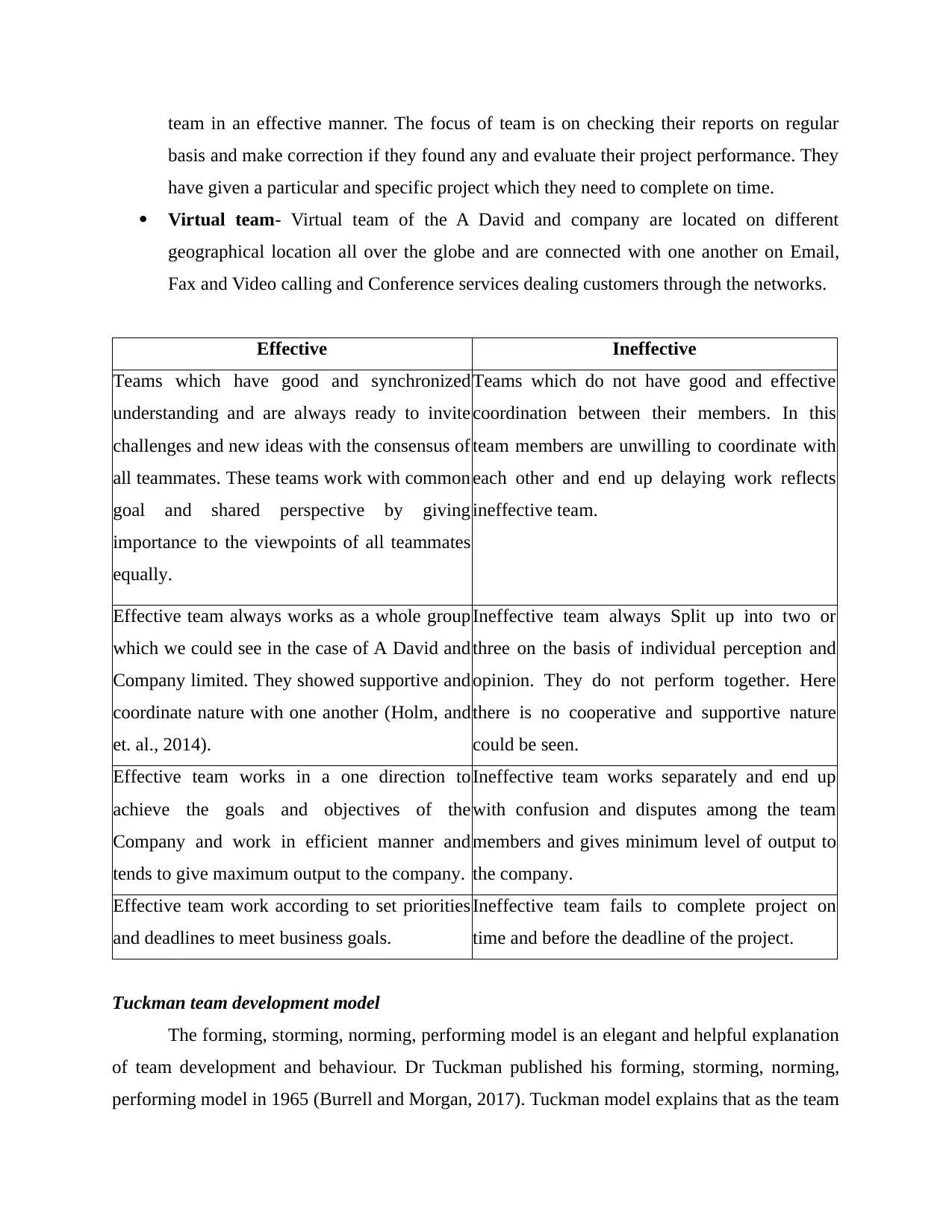
team in an effective manner. The focus of team is on checking their reports on regular
basis and make correction if they found any and evaluate their project performance. They
have given a particular and specific project which they need to complete on time.
Virtual team- Virtual team of the A David and company are located on different
geographical location all over the globe and are connected with one another on Email,
Fax and Video calling and Conference services dealing customers through the networks.
Effective Ineffective
Teams which have good and synchronized
understanding and are always ready to invite
challenges and new ideas with the consensus of
all teammates. These teams work with common
goal and shared perspective by giving
importance to the viewpoints of all teammates
equally.
Teams which do not have good and effective
coordination between their members. In this
team members are unwilling to coordinate with
each other and end up delaying work reflects
ineffective team.
Effective team always works as a whole group
which we could see in the case of A David and
Company limited. They showed supportive and
coordinate nature with one another (Holm, and
et. al., 2014).
Ineffective team always Split up into two or
three on the basis of individual perception and
opinion. They do not perform together. Here
there is no cooperative and supportive nature
could be seen.
Effective team works in a one direction to
achieve the goals and objectives of the
Company and work in efficient manner and
tends to give maximum output to the company.
Ineffective team works separately and end up
with confusion and disputes among the team
members and gives minimum level of output to
the company.
Effective team work according to set priorities
and deadlines to meet business goals.
Ineffective team fails to complete project on
time and before the deadline of the project.
Tuckman team development model
The forming, storming, norming, performing model is an elegant and helpful explanation
of team development and behaviour. Dr Tuckman published his forming, storming, norming,
performing model in 1965 (Burrell and Morgan, 2017). Tuckman model explains that as the team
basis and make correction if they found any and evaluate their project performance. They
have given a particular and specific project which they need to complete on time.
Virtual team- Virtual team of the A David and company are located on different
geographical location all over the globe and are connected with one another on Email,
Fax and Video calling and Conference services dealing customers through the networks.
Effective Ineffective
Teams which have good and synchronized
understanding and are always ready to invite
challenges and new ideas with the consensus of
all teammates. These teams work with common
goal and shared perspective by giving
importance to the viewpoints of all teammates
equally.
Teams which do not have good and effective
coordination between their members. In this
team members are unwilling to coordinate with
each other and end up delaying work reflects
ineffective team.
Effective team always works as a whole group
which we could see in the case of A David and
Company limited. They showed supportive and
coordinate nature with one another (Holm, and
et. al., 2014).
Ineffective team always Split up into two or
three on the basis of individual perception and
opinion. They do not perform together. Here
there is no cooperative and supportive nature
could be seen.
Effective team works in a one direction to
achieve the goals and objectives of the
Company and work in efficient manner and
tends to give maximum output to the company.
Ineffective team works separately and end up
with confusion and disputes among the team
members and gives minimum level of output to
the company.
Effective team work according to set priorities
and deadlines to meet business goals.
Ineffective team fails to complete project on
time and before the deadline of the project.
Tuckman team development model
The forming, storming, norming, performing model is an elegant and helpful explanation
of team development and behaviour. Dr Tuckman published his forming, storming, norming,
performing model in 1965 (Burrell and Morgan, 2017). Tuckman model explains that as the team
Paraphrase This Document
Need a fresh take? Get an instant paraphrase of this document with our AI Paraphraser
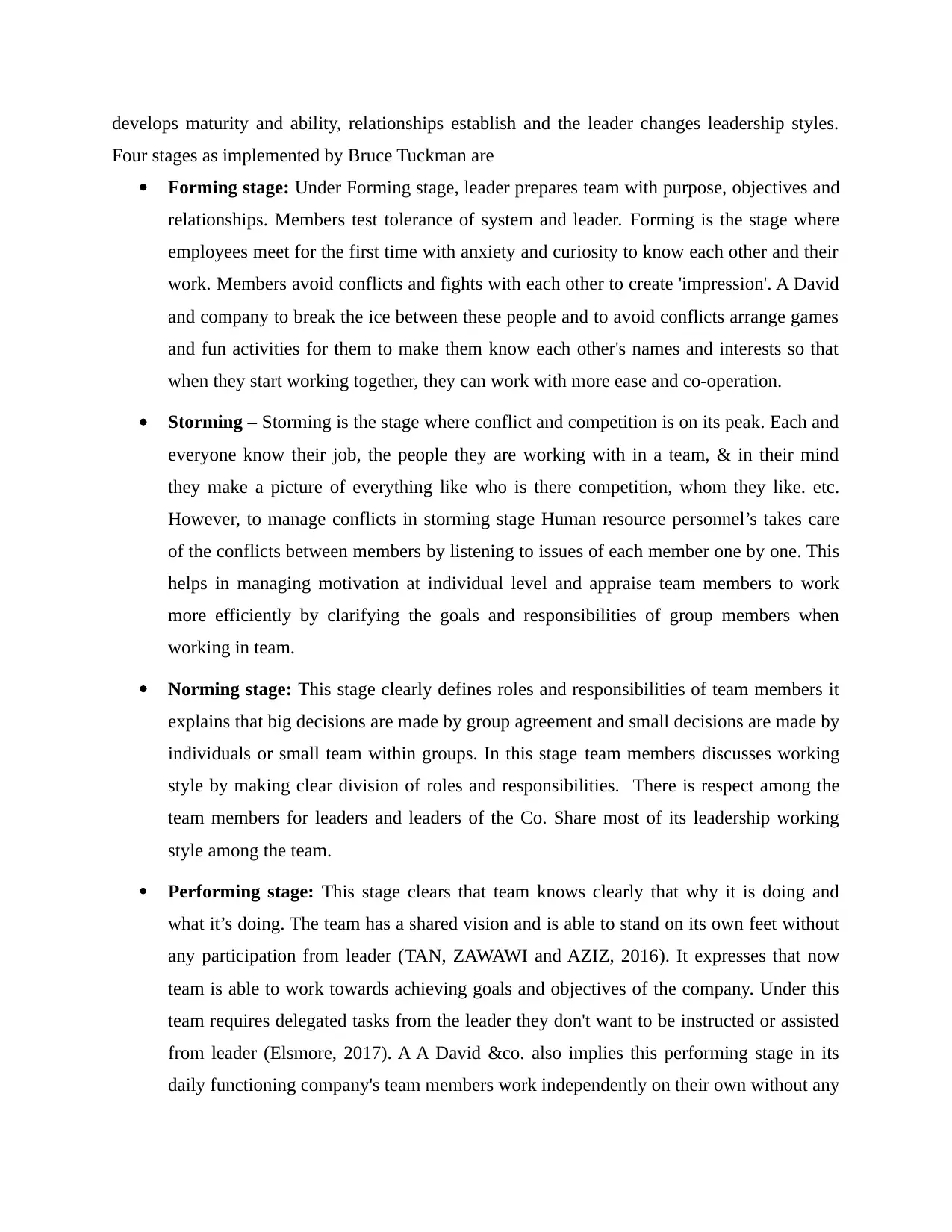
develops maturity and ability, relationships establish and the leader changes leadership styles.
Four stages as implemented by Bruce Tuckman are
Forming stage: Under Forming stage, leader prepares team with purpose, objectives and
relationships. Members test tolerance of system and leader. Forming is the stage where
employees meet for the first time with anxiety and curiosity to know each other and their
work. Members avoid conflicts and fights with each other to create 'impression'. A David
and company to break the ice between these people and to avoid conflicts arrange games
and fun activities for them to make them know each other's names and interests so that
when they start working together, they can work with more ease and co-operation.
Storming – Storming is the stage where conflict and competition is on its peak. Each and
everyone know their job, the people they are working with in a team, & in their mind
they make a picture of everything like who is there competition, whom they like. etc.
However, to manage conflicts in storming stage Human resource personnel’s takes care
of the conflicts between members by listening to issues of each member one by one. This
helps in managing motivation at individual level and appraise team members to work
more efficiently by clarifying the goals and responsibilities of group members when
working in team.
Norming stage: This stage clearly defines roles and responsibilities of team members it
explains that big decisions are made by group agreement and small decisions are made by
individuals or small team within groups. In this stage team members discusses working
style by making clear division of roles and responsibilities. There is respect among the
team members for leaders and leaders of the Co. Share most of its leadership working
style among the team.
Performing stage: This stage clears that team knows clearly that why it is doing and
what it’s doing. The team has a shared vision and is able to stand on its own feet without
any participation from leader (TAN, ZAWAWI and AZIZ, 2016). It expresses that now
team is able to work towards achieving goals and objectives of the company. Under this
team requires delegated tasks from the leader they don't want to be instructed or assisted
from leader (Elsmore, 2017). A A David &co. also implies this performing stage in its
daily functioning company's team members work independently on their own without any
Four stages as implemented by Bruce Tuckman are
Forming stage: Under Forming stage, leader prepares team with purpose, objectives and
relationships. Members test tolerance of system and leader. Forming is the stage where
employees meet for the first time with anxiety and curiosity to know each other and their
work. Members avoid conflicts and fights with each other to create 'impression'. A David
and company to break the ice between these people and to avoid conflicts arrange games
and fun activities for them to make them know each other's names and interests so that
when they start working together, they can work with more ease and co-operation.
Storming – Storming is the stage where conflict and competition is on its peak. Each and
everyone know their job, the people they are working with in a team, & in their mind
they make a picture of everything like who is there competition, whom they like. etc.
However, to manage conflicts in storming stage Human resource personnel’s takes care
of the conflicts between members by listening to issues of each member one by one. This
helps in managing motivation at individual level and appraise team members to work
more efficiently by clarifying the goals and responsibilities of group members when
working in team.
Norming stage: This stage clearly defines roles and responsibilities of team members it
explains that big decisions are made by group agreement and small decisions are made by
individuals or small team within groups. In this stage team members discusses working
style by making clear division of roles and responsibilities. There is respect among the
team members for leaders and leaders of the Co. Share most of its leadership working
style among the team.
Performing stage: This stage clears that team knows clearly that why it is doing and
what it’s doing. The team has a shared vision and is able to stand on its own feet without
any participation from leader (TAN, ZAWAWI and AZIZ, 2016). It expresses that now
team is able to work towards achieving goals and objectives of the company. Under this
team requires delegated tasks from the leader they don't want to be instructed or assisted
from leader (Elsmore, 2017). A A David &co. also implies this performing stage in its
daily functioning company's team members work independently on their own without any
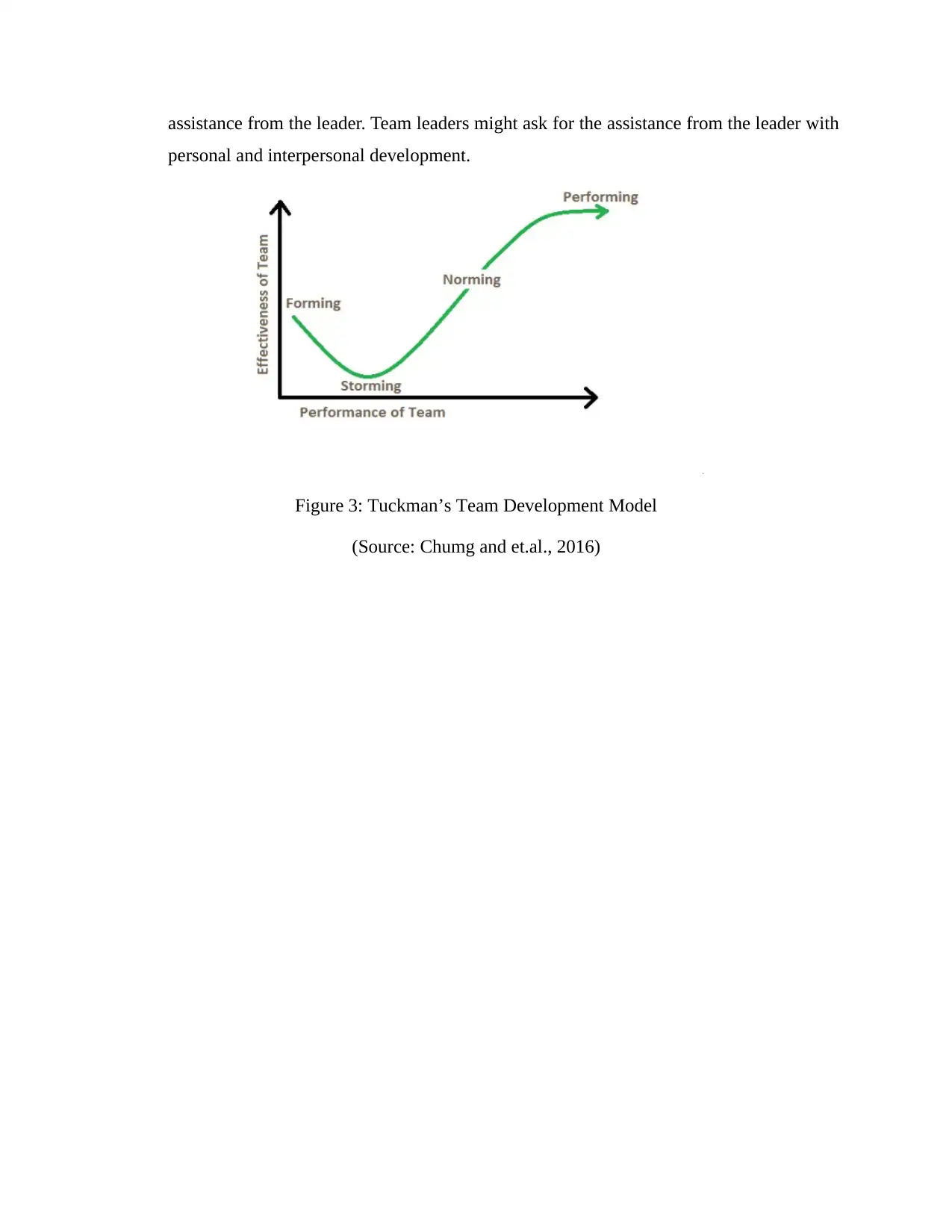
assistance from the leader. Team leaders might ask for the assistance from the leader with
personal and interpersonal development.
Figure 3: Tuckman’s Team Development Model
(Source: Chumg and et.al., 2016)
personal and interpersonal development.
Figure 3: Tuckman’s Team Development Model
(Source: Chumg and et.al., 2016)
⊘ This is a preview!⊘
Do you want full access?
Subscribe today to unlock all pages.

Trusted by 1+ million students worldwide
1 out of 18
Related Documents
Your All-in-One AI-Powered Toolkit for Academic Success.
+13062052269
info@desklib.com
Available 24*7 on WhatsApp / Email
![[object Object]](/_next/static/media/star-bottom.7253800d.svg)
Unlock your academic potential
Copyright © 2020–2026 A2Z Services. All Rights Reserved. Developed and managed by ZUCOL.





